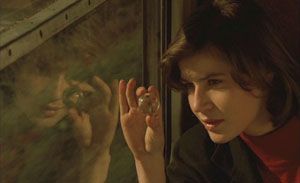
If this were the only one of Kieślowski's works I'd seen, I'm sure I'd be quite taken by it. He has a way of tapping into the ephemeral, transitory nature of really important questions, and that's clearly at work here. He beautifully weaves together the mysteries of identity, fate, connection with other human beings—it's a film with a lot to say, and a lot to ask.
In the course of Kieślowski's career, The Double Life of Veronique falls between The Decalogue and the Three Colors trilogy. Unfortunately, I didn't find this film to measure up to either of those series in any important way.
Thematically, Veronique shares plenty of elements with the rest of his oeuvre. That tapestry of questions stretches throughout. But if I imagine the whole thing as a conversation he's having with himself, this film seems more an off-hand remark than a substantive contribution. Take it out, and not much is lost.
Visually, Kieślowski is really never less than a master. He does produce some iconic images here, and in certain moments it's quite poignant. It is never as compelling, though, as his best work. It lacks the raw intimacy of The Decalogue, and the sumptuous immersion of Three Colors. Not that it needs to emulate those other works, any more than they emulate each other. But Veronique simply isn't on the same level. The aesthetic is inconsistent, unfocused, and just when you start to get hooked, it loses its grip.
Other aspects of the film are even less impressive. Irene Jacob is spectacular in Red, but here she hits far too many wrong notes. Granted, she isn't given enough to work with. Weronika, in particular, is a giddy girl in a woman's body, searching in every moment for someone else to lean on. The only times she seems at all in control are when she's singing, and unfortunately those moments are seriously marred by the poor lip syncing. I hate to dwell on what would otherwise be a minor technical detail, but it really is critical here.
Veronique is more interesting, but still a bit more bland than she needs to be. Part of the problem with the film in general is Kieślowski's (truly uncharacteristic) impatience in pivotal moments. When Veronique discovers the photo from Kraków, for instance, she doesn't dwell on it, she doesn't slowly fade. She simply breaks into sobs. Moments like that give the film a kind of skeletal feel, and I'd certainly like them to be fleshed out.
In a similar way, the film suffers from often far-too-direct dialogue. In all of his films, Kieślowski wants to move obliquely through his subject matter, never facing it full on, and never approaching any kind of blunt moralizing or didacticism. He's far more successful in his other work than he is here, unfortunately. The characters in Veronique keep trying to articulate the film's central themes—that sense of detachment, or of a division within oneself. The thrust of the film is to indicate that this feeling can't really be captured, and yet still they keep talking about it.
All that said, and I mean this sincerely, it's a good film. I'm tempted to view it as a starting point for a brilliant director, notwithstanding The Decalogue and the lengthy career that preceded it. If it wasn't the beginning of Kieślowski's career, still it feels like a beginning of some kind. Perhaps as I see more of his early work, I'll find this to be a significant move in a new direction. Even now, it's not hard for me to see how this led into the Three Colors trilogy. And as I said before, if this were all the Kieślowski I'd ever seen, I'd definitely want to see more.

No comments:
Post a Comment